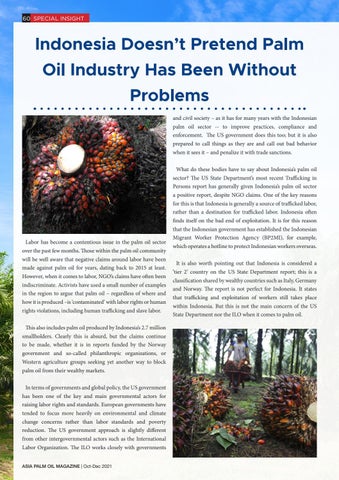60 SPECIAL INSIGHT
Indonesia Doesn’t Pretend Palm Oil Industry Has Been Without Problems and civil society – as it has for many years with the Indonesian palm oil sector -- to improve practices, compliance and enforcement. The US government does this too; but it is also prepared to call things as they are and call out bad behavior when it sees it – and penalize it with trade sanctions. What do these bodies have to say about Indonesia’s palm oil sector? The US State Department’s most recent Trafficking in
Labor has become a contentious issue in the palm oil sector over the past few months. Those within the palm oil community will be well aware that negative claims around labor have been made against palm oil for years, dating back to 2015 at least. However, when it comes to labor, NGO’s claims have often been indiscriminate. Activists have used a small number of examples in the region to argue that palm oil – regardless of where and how it is produced –is ‘contaminated’ with labor rights or human rights violations, including human trafficking and slave labor. This also includes palm oil produced by Indonesia’s 2.7 million smallholders. Clearly this is absurd, but the claims continue to be made, whether it is in reports funded by the Norway government and so-called philanthropic organizations, or Western agriculture groups seeking yet another way to block palm oil from their wealthy markets. In terms of governments and global policy, the US government has been one of the key and main governmental actors for raising labor rights and standards. European governments have tended to focus more heavily on environmental and climate change concerns rather than labor standards and poverty reduction. The US government approach is slightly different from other intergovernmental actors such as the International Labor Organization. The ILO works closely with governments ASIA PALM OIL MAGAZINE | Oct-Dec 2021
Persons report has generally given Indonesia’s palm oil sector a positive report, despite NGO claims. One of the key reasons for this is that Indonesia is generally a source of trafficked labor, rather than a destination for trafficked labor. Indonesia often finds itself on the bad end of exploitation. It is for this reason that the Indonesian government has established the Indonesian Migrant Worker Protection Agency (BP2MI), for example, which operates a hotline to protect Indonesian workers overseas. It is also worth pointing out that Indonesia is considered a ‘tier 2’ country on the US State Department report; this is a classification shared by wealthy countries such as Italy, Germany and Norway. The report is not perfect for Indonesia. It states that trafficking and exploitation of workers still takes place within Indonesia. But this is not the main concern of the US State Department nor the ILO when it comes to palm oil.










